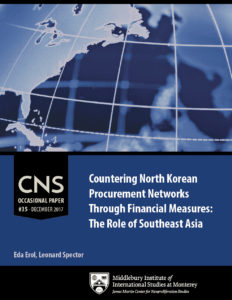December 11, 2017 • Updated August 13, 2020
Eda Erol, Leonard Spector
Occasional Paper #35

Executive Summary
This Occasional Paper is made up of four studies intended to aid Southeast Asian governments and financial institutions in their efforts to counter the financing of weapon of mass destruction programs in North Korea and other states of concern.
“Countering North Korean Procurement Networks through Financial Measures: The Role of Southeast Asia,” highlights how North Korea has exploited weak financial controls in the region to advance its nuclear and missile programs. The study reviews Security Council and Financial Action Task Force actions to combat such abuse of the international banking system, as well as the role of US sanctions. Effective implementation of these measures in Southeast Asia, the study concludes, could contribute significantly to constraining North Korea and other proliferant states.
“Needed Next Steps to Strengthen Measures to Counter Proliferation Finance,” identifies gaps in international measures to combat proliferation finance, and calls on the Security Council and the Financial Action Task Force to clarify standards for national-level implementation of counter-proliferation-finance rules and to adopt improved enforcement mechanisms. The analysis urges Southeast Asian governments and financial institutions to implement existing measures with greater vigor. “Chinpo Shipping: A Singaporean Financial Agent of North Korea” details how North Korea created an off-shore de facto bank to finance its illegal activities and how Singapore’s courts addressed the first known prosecution for financing proliferation. The case underscores that greater due diligence by banks and regulatory authorities is urgently needed.
Finally, “Due Diligence and the Panama Papers Episode: Lessons for Proliferation Finance,” shows how a North Korean bank, denied access to the international banking system, set up an off-shore entity to transact its business. The analysis calls for greatly strengthened enforcement efforts by offshore tax havens, closer scrutiny of clients by banks and law firms conducting international business, and greater efforts by Southeast Asian governments to block sanctions-violating front companies from accessing their banking systems.
View Studies as Separate Files
- Countering North Korean Procurement Networks Through Financial Measures: The Role of Southeast Asia (Download)
- Needed Next Steps to Strengthen Measures to Counter Proliferation Finance (Download)
- Chinpo Shipping: A Singaporean Financial Agent of North Korea (Download)
- Due Diligence And The Panama Papers Episode: Lessons For Proliferation Finance (Download)
View Training Presentations
- Basics of Countering Proliferation Finance (Download)
- Chinpo Shipping Case (Download)
- Training Materials: Countering North Korean Procurement Networks through Financial Measures: Role of Southeast Asia (Download)
- Training Materials: Financial Dimensions of Tsai Case Study (Download)
